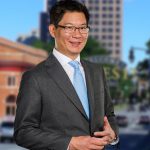Written by: Molly Smith
David Tang embodies the intersection of intellectual curiosity and practical problem-solving that defines exceptional legal practice. Twenty years removed from his Syracuse Law days, this Class of 2005 graduate has built a distinguished career as a partner at Underberg & Kessler LLP in Rochester, New York, where he chairs both the Healthcare and Creditors’ Rights practice groups.
David’s path to law began with early exposure to the legal profession. His father, a Syracuse Law alumnus from the 1980s, pursued law as a second career, while his uncle practiced intellectual property law in New York City for decades. These positive role models, combined with formative employment experiences at the Montgomery County Circuit Court in Maryland and the U.S. State Department legal advisor’s office, gave David early confidence that he could succeed in the legal field.
After earning his bachelor’s degree from Cornell University, David spent three years as a paralegal at White & Case LLP in New York City. David developed an appreciation for high-level legal practice while working in a sophisticated environment where five or six attorneys often collaborated on one file. The experience was particularly memorable as the firm worked on the Bush v. Gore case during his tenure, which he then got to read about in school. He reflects, “I was able to see really good, smart lawyers who love the law, willing to dedicate six or seven days a week to practice.” This exposure to excellence, combined with the confidence that he was making the right choice in pursuing the law, made his transition to law school seamless.
David’s decision to attend Syracuse Law was influenced by his positive undergraduate experience in upstate New York and practical considerations, including the presence of Wegmans and free parking after years in New York City. His timing proved fortuitous, arriving during Carmelo Anthony’s national championship basketball season.
At Syracuse, David embraced both academic rigor and extracurricular pursuits that reflected his diverse interests. He participated in club volleyball for his first two years, joined a string quartet during his third year, served on the Syracuse Law Review, and appreciated the intellectual vibrancy that surrounded the law school.
Beyond his legal practice, David is deeply engaged in community service. He served on boards for affordable housing and alternative dispute resolution organizations. He currently serves on the board of WXXI, Rochester’s public radio and television station.
David’s practice today reflects both the problem-solving approach that drew him to law initially and the intellectual curiosity that shapes how he approaches every challenge. “I like helping people,” he says simply, describing his work as navigating complex or unclear situations to offer clarity and guidance. His clients span healthcare institutions, financial creditors, businesses, nonprofits, and individuals, each presenting unique challenges that require creative solutions.
“Good lawyers are curious,” he emphasizes, “because we don’t get the questions if the answer is black and white. We get them when it’s in the gray area where two sides can look at the same facts and reach different conclusions.” His varied pursuits, from music to community theater to public broadcasting, inform his ability to see legal problems from multiple angles and craft solutions that account for competing interests.
This philosophy was shaped partly by his fascination with constitutional law during law school, where he learned that depending on whether you applied due process or equal protection analysis to the same facts, you could reach entirely different constitutional conclusions. “That, to me, was always interesting and amazing,” he reflects. This intellectual curiosity extends beyond legal doctrine. David approaches each client matter with the same wide-ranging perspective that led him to pursue music, volunteer board work, and community engagement. Whether analyzing behavioral psychology in contract disputes or drawing on his arts background to understand different stakeholder perspectives, his curiosity-driven approach enables him to navigate complex legal challenges.
David’s perspective on professional development emphasizes sustained effort over shortcuts. When asked about any advice he had for young lawyers, he said, “I think the passion or true enjoyment comes after the hard work has been put in to get to a certain level of mastery.” Drawing an analogy to art or music, he suggests that deep appreciation develops only after understanding what excellence requires. He advocates for the “10,000 hours” approach to expertise, noting that passion can come after becoming an expert. Honing your skills allows you to enjoy them.
David’s networking philosophy is equally driven by inquisitiveness. He advises young lawyers to join bar associations, develop relationships with practitioners in their field, attend conferences consistently, and eventually contribute by speaking and writing. He explains, “If you’re intentional in building relationships outside of the office, all those lead to new connections that are going to be helpful down the road.”
For current students, David emphasizes being “open to serendipity” – until you’ve handled cases in a particular area, you can’t know if you’ll truly enjoy it. He encourages developing multiple competencies: careful reading and analysis, active listening, attention to detail, and the ability to deliver difficult news when necessary.
David’s journey from curious undergraduate to accomplished partner illustrates how early exposure, strategic career choices, and sustained dedication can create a fulfilling legal career rooted in service to others.

